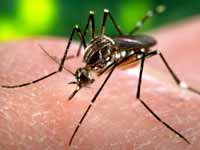By GILLIAN WONG,Associated Press Writer
The global spread of swine flu will endanger more lives as it speeds up in the coming months and governments must boost preparations for a swift response to a coming "explosion" of cases, the World Health Organization said Friday.
Many countries could see swine flu cases double every three to four days for several months until peak transmission is reached, once cold weather returns to the northern hemisphere, said WHO's Western Pacific director, Shin Young-soo.
"At a certain point, there will seem to be an explosion in case numbers," Shin told a symposium of health officials and experts in Beijing. "It is certain there will be more cases and more deaths."
The WHO says the swine flu virus _ also known as H1N1 _ has killed almost 1,800 people worldwide, and has declared a pandemic.
International attention has focused on how the pandemic is progressing in southern hemisphere countries such as Australia where winter _ and the flu season _ has started.
But it is in developing countries that the accelerated spread of swine flu poses the greatest threat as it places underequipped and underfunded health systems under severe strain, Shin said.
WHO earlier estimated that as many as 2 billion people could become infected over the next two years _ nearly one-third of the world's population.
Others said Shin's cautionary comments were needed but that they were optimistic the spread would not be that serious.
Ann Moen, an influenza expert with the U.S. Centers for Disease Control and Prevention, said that if current trends continue it is possible that the swine flu pandemic will not be worse than a severe flu season.
"I think the world was preparing for an H5N1 (bird flu) pandemic and we didn't get that. So maybe this is our supreme tabletop exercise, a global sort of practice for something bigger," Moen told The Associated Press.
Health officials and drug makers are considering how to speed up production of a vaccine before the northern hemisphere enters its flu season in coming months.
Estimates for when a vaccine will be available range from September to December.
Delegates from Bangladesh and Myanmar appealed for help in procuring vaccines or making them more affordable for poorer countries, saying they were left vulnerable while rich nations pre-ordered most of the available stock.
"Developing countries like us, we have to fight this war without vaccines," said Mya Oo, deputy health minister of Myanmar. He urged pharmaceutical companies to consider selling the vaccines to developing countries at just above cost.
WHO's flu chief, Keiji Fukuda, said the agency was working hard on the issue, and noted that two drugmakers had pledged to donate 150 million doses of vaccine to poorer countries by the end of October. He said more research was needed to determine how vaccines will be priced.
"Among the many pandemic response issues, this is probably the most critical issue: how we mobilize the vaccines, how we get them to developing countries," Fukuda said.
WHO has stressed that most cases of swine flu are mild and require no treatment, but the fear is that a rash of new infections could overwhelm hospitals and health authorities, especially in poorer countries.
Shin said governments must quickly educate the public, prepare their health systems to care for severe cases and protect those deemed more vulnerable to prevent unnecessary deaths.
"We only have a short time period to reach the state of preparedness deemed necessary," Shin said. "Communities must be aware before a pandemic strikes as to what they can do to reduce the spread of the virus, and how to obtain early treatment of severe cases."
Pregnant women face a higher risk of complications, and the virus also has more severe effects on people with underlying medical conditions such as asthma, cardiovascular disease, diabetes, autoimmune disorders and diabetes, WHO chief Margaret Chan said in a video address.
The last pandemic _ the Hong Kong flu of 1968 _ killed about 1 million people. Ordinary flu kills about 250,000 to 500,000 people each year.
Swine flu is also continuing to spread during summer in the northern hemisphere. Normally, flu viruses disappear with warm weather, but swine flu is proving to be resilient.
Influenza A(H1N1) Malaysia Updates
August 22, 2009 : No fatalities were recorded for the second consecutive day, as 310 Influenza A(H1N1) cases were discharged from hospitals as of 8am today.
The number of deaths due to Influenza A(H1N1) remained at 68 while 1,476 cases are being treated at 102 hospitals nationwide including three private hospitals, said Director-General of Health Tan Sri Dr Mohd Ismail Merican in a statement today.
Dr Mohd Ismail said according to the World Health Organisation (WHO) report, H1N1 pandemic was still active in 182 countries.
He added that as of 8am today, the WHO had reported 1,227 new cases and 34 deaths, raising the overall total of HiN1 cases to 234,569 and the number of deaths, to 2,433.
Dr Mohd Ismail advised people with ILI or those with H1N1 like symptoms to stay away from public places, including avoiding crowded places like Ramadan bazaars, mosques and other religious places.
"Those who have slight cough or fever should also avoid such places and if they have to go to such places, they must wear masks to reduce the risk factor," he said. - Bernama
BANGKOK - Thailand has confirmed 14 new deaths linked to swine flu, raising the country's toll to 111.
Thailand's total number of swine flu cases has now reached 13,019.
Islam's fasting month of Ramadan begins on Saturday
RIYADH (AFP) - - Islam's fasting month of Ramadan begins on Saturday in most of the Arab world and Iran, but swine flu has cast a cloud over pilgrimages to Mecca and might also dampen enthusiasm for the popular evening get-togethers to break the fast.
In Mecca, the Saudi birthplace of Islam, pilgrim arrivals surged this week ahead of Ramadan, but the numbers were well below usual.
Egypt, Iran and Iraq are among countries that have placed restrictions on those permitted to undertake the minor pilgrimage, or umrah, during Ramadan because of swine flu.
Normally several hundred thousand people perform the umrah, a shortened version of the major hajj pilgrimage that takes place this year in November.
The umrah is popular because the faithful can arrive at any time and do not need the permits that are assigned to countries by quota for the hajj, which is required of Muslims once in their lifetime if they have the means.
However, with flu cases rising, and with the disease having touched nearly all the region, warnings from governments and the World Health Organisation have heightened fears of being in crowded places.
After the region's first death in July, health ministers and WHO officials met in Cairo and recommended discouraging or banning people over 65, pregnant women and children under 12 from joining either the umrah or the hajj.
Saudi Arabia did not apply mandatory controls but has urged countries to voluntarily implement restrictions.
The impact of the pandemic on Ramadan iftar dinners when people sometimes invite hundreds to break the fast together in homes, tents or hotel ballrooms just after sunset has yet to be seen.
But Kuwait's health minister has already advised people to stop shaking hands and kissing each other at such gatherings to stem the spread of the disease.
While fasting and iftar are the most well-known elements of Ramadan in the popular mind, this ninth month of the Muslim calendar is meant to be a deeply prayerful. It includes the day on which Muslim's believe God gave the holy Koran, to Mohammed.
Ramadan ends with the holiday known as Eid al-Fitr. On this Festival of Breaking the Fast, communal prayers are held early in the morning. Then people wearing their finest clothes, often bought for the occasion, begin feasting, visiting relatives and friends, giving gifts to children and donating food to the poor.
Earth becoming a disease hot spot : The warming earth is making us sick. Rising temperatures, frequent floods and prolonged droughts are ideal conditions for infectious diseases to spread. "Global warming is fuelling epidemics in areas which are unprepared. We're seeing the emergence of new diseases around the world. Old diseases are also coming back with a vengeance," Climate change has dramatically changing infection trends.
DENGUE DEATH CASES INCREASES BY 65% IN 2010
SAVE THE WORLD - STOP GLOBAL WARMING

Either You're With Me or You're Against Me in Stopping Global Warming!
Global Warming Articles
Let's Go Green & Save The World : Mentor Gemilang
The Truth Hurts - Truth is such a rare thing, it is delighted to tell it.

You can fool some of the people all of the time, and all of the people some of the time, but you can not fool all of the people all of the time.
Most truths are so naked that people feel sorry for them and cover them up, at least a little bit.
Truth always rests with the minority, and the minority is always stronger than the majority, because the minority is generally formed by those who really have an opinion, while the strength of a majority is illusory, formed by the gangs who have no opinion
Let's Go Green - Mentor Gemilang 1 - Visitors from 90 Countries
LATEST NEWS
Are u protected against Influenza A(H1N1)?
Repentance (At Taubah)
We can never be perfect since even prophets have at times made mistakes. Repentance means to abandon one's rebelliousness and arrogance before God and to stop deliberately disregarding His commandments without feeling any shame. Repentance also means to humbly hope for the mercy of God and to fear His judgment while doing the best one can to fulfill divine wishes within the limits of one's human weaknesses.


